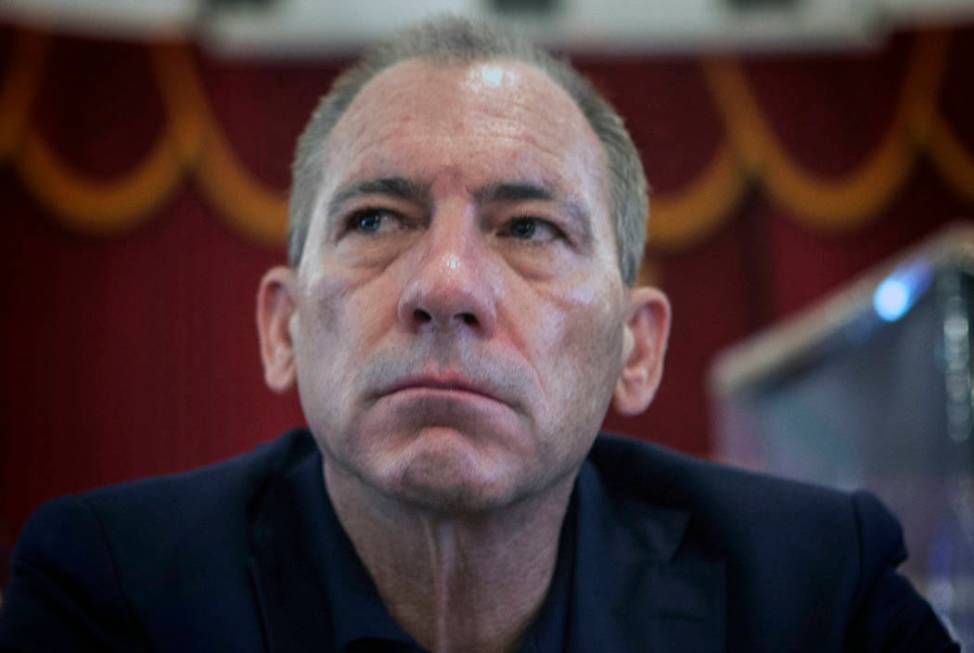Feds’ decision on pot laws may create issues for casinos

In November, Nevada’s Gaming Policy Committee begged for guidance from the federal government about whether the feds are going to enforce federal laws passed in 1970 that criminalized pot use, cultivation and distribution.
Nevadans got their answer Thursday, but it wasn’t the one many wanted. The feds aren’t about to legalize pot. Instead of feds using discretion as happened under the Obama administration, it appears Nevada’s decision to legalize recreational marijuana could see businesses, including casinos, prosecuted for breaking federal pot or banking laws.
On Wednesday, Attorney General Jeff Sessions appointed a Texas prosecutor, a graduate of Brigham Young University law school, to head the U.S. attorney’s office, at least on an interim basis. Dayle Elieson took charge Friday, and Sessions said, “At the federal level, she has successfully taken on fraudsters, money launderers, and terrorists.”
On Thursday, Sessions directed federal prosecutors to “enforce the laws enacted by Congress and to follow well-established principles when pursuing prosecutions related to marijuana activities.” He called it a “return to the rule of law.”
You don’t have to read between the lines. Over two days, the Trump administration made it clear it wouldn’t be legalizing federal marijuana laws, even if states did.
Casinos now may be vulnerable to civil racketeering and criminal money laundering investigations.
Based on the Nov. 29 discussion among the gaming policy members, casino operators are concerned about violating money laundering laws if they end up accepting cash from those in the marijuana business.
Because banks have been cautious about opening accounts for the pot cash, and casinos are considered banking institutions under federal law, what happens if casinos accept cash from pot businesses, either knowingly or unwittingly?
One Washington, D.C., lawyer, Brian Barnes, was hard-nosed in his testimony. “At what point do you (casinos) become a co-conspirator?”
What happens if a Nevada businessman with a legitimate business also invested in a pot business? What steps must the casinos take to determine if the cash being deposited at the cage is from the legitimate businesses or not?
Nevada gaming regulators have taken the firm stance that you can’t hold a gaming license and be in the pot business.
President Donald Trump doesn’t drink alcohol and had a brother who died of chronic alcoholism at the age 41. It seems unlikely he’s personally in favor of decriminalizing recreational marijuana.
As a candidate, he said legalizing marijuana is a state’s rights issue. It’s uncertain whether Trump understood that federal drug laws override the state laws.
Nevada voters approved recreational pot in 2016.
A spending bill in May wouldn’t allow use of federal funds to prosecute medical marijuana businesses in states where medical marijuana is legal. Business Insider reported that at the signing Trump said one section “ provides that the Department of Justice may not use any funds to prevent implementation of medical marijuana laws by various States and territories. I will treat this provision consistently with my constitutional responsibility to take care that the laws be faithfully executed.”
Marijuana advocate Tom Angell, the founder of Marijuana Majority, told Business Insider at that time he thinks that Trump’s statement is the federal government’s way of “asserting their right” to go after certain medical marijuana businesses if they choose to at a later date.
The Gaming Policy Committee will meet again this winter to decide on recommendations for the 2018 Legislature, but Thursday’s announcement is a game changer.
Will the committee be likely to approve allowing conventions in casinos where pot businesses are discussed but pot is not sold? From the discussion then, that seemed quite possible. Today, not so much.
My favorite part of the Nov. 29 meeting was the testimony of former Sheriff Bill Young, now the compliance officer for Station Casinos.
He has a gaming license, he’s a former lawman, and he wanted to join the get-rich-fast crowd by entering the pot business.
“I’m not embarrassed to tell you this story,” Young said.
He explained that early on, friends of his wanted to give him a 10 percent interest in their marijuana cultivation business for his help with security advice. “When you went to Gorman High School in the ’70s, you know those who are in this business today,” he said, to a roar of laughter in the Clark County Commission chambers.
He ran it up the chain of command at Station Casinos, and an executive called Gaming Control Board Chairman A.G. Burnett to ask if that was permissible.
Young said that Burnett responded, “You tell Mr. Young if he goes forward, I’ll call him forward (for licensing suitability) so fast it will make his head spin.”
Young admitted he hadn’t thought it through at that point.
For now, the strict positions of Nevada gaming regulators regarding marijuana will prevail and may become more stringent.
No casino operator wants to be hit with a federal money laundering complaint. Wouldn’t be prudent.
Meanwhile, I’ll be watching to see what sort of indictments are issued under Elieson’s name.
Jane Ann Morrison’s column runs Sundays in the Nevada section. Contact her at jane@reviewjournal.com or 702-383-0275. Follow @janeannmorrison on Twitter.